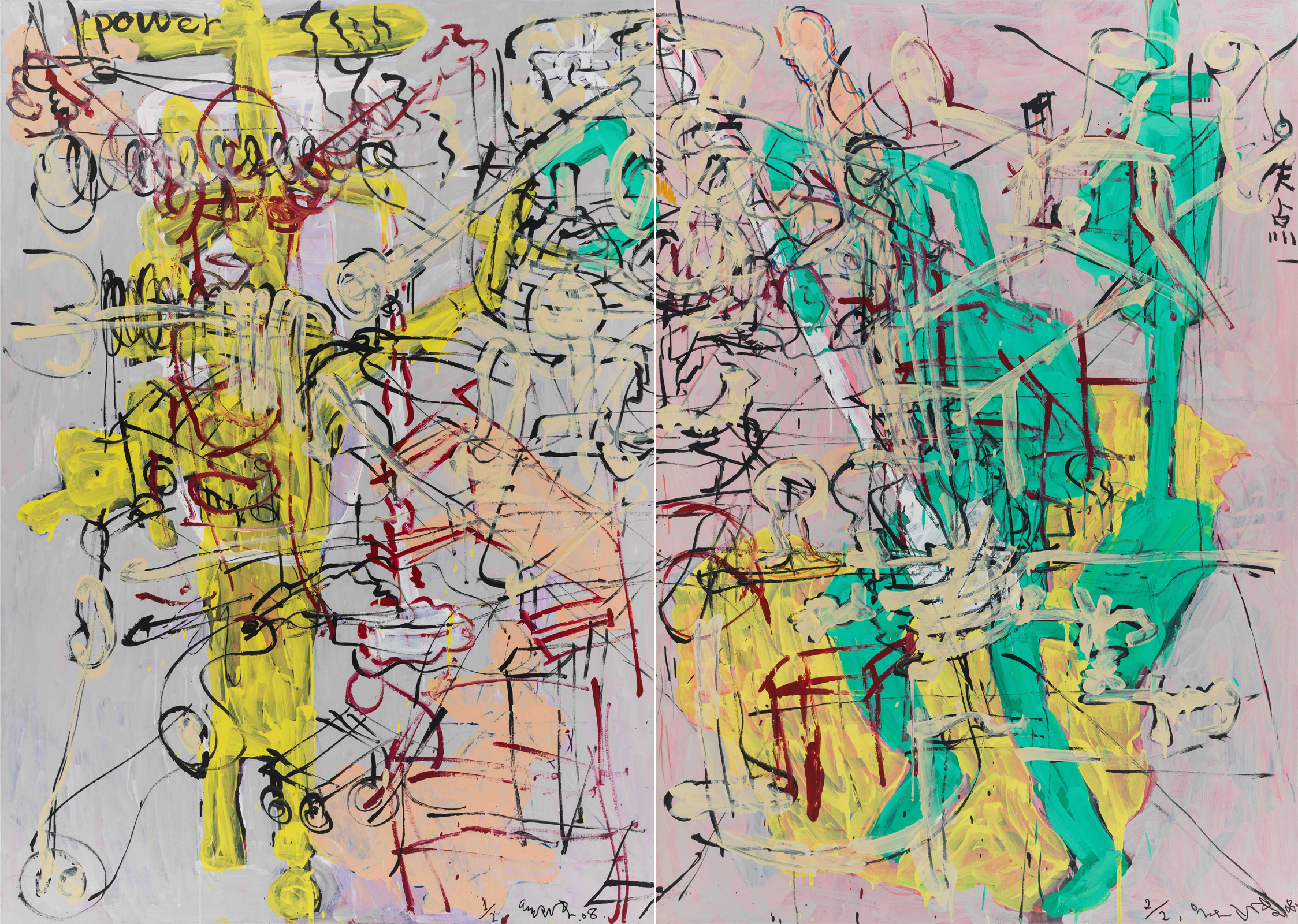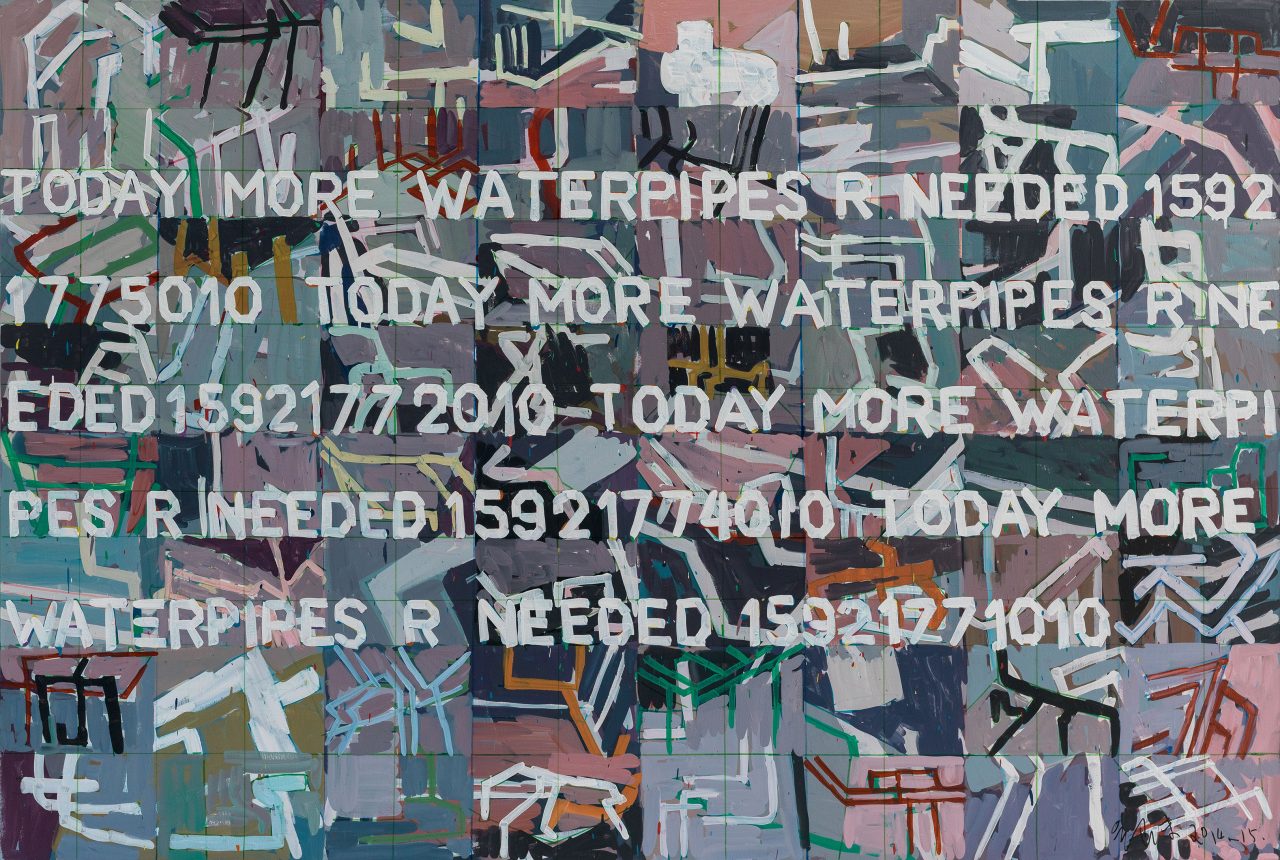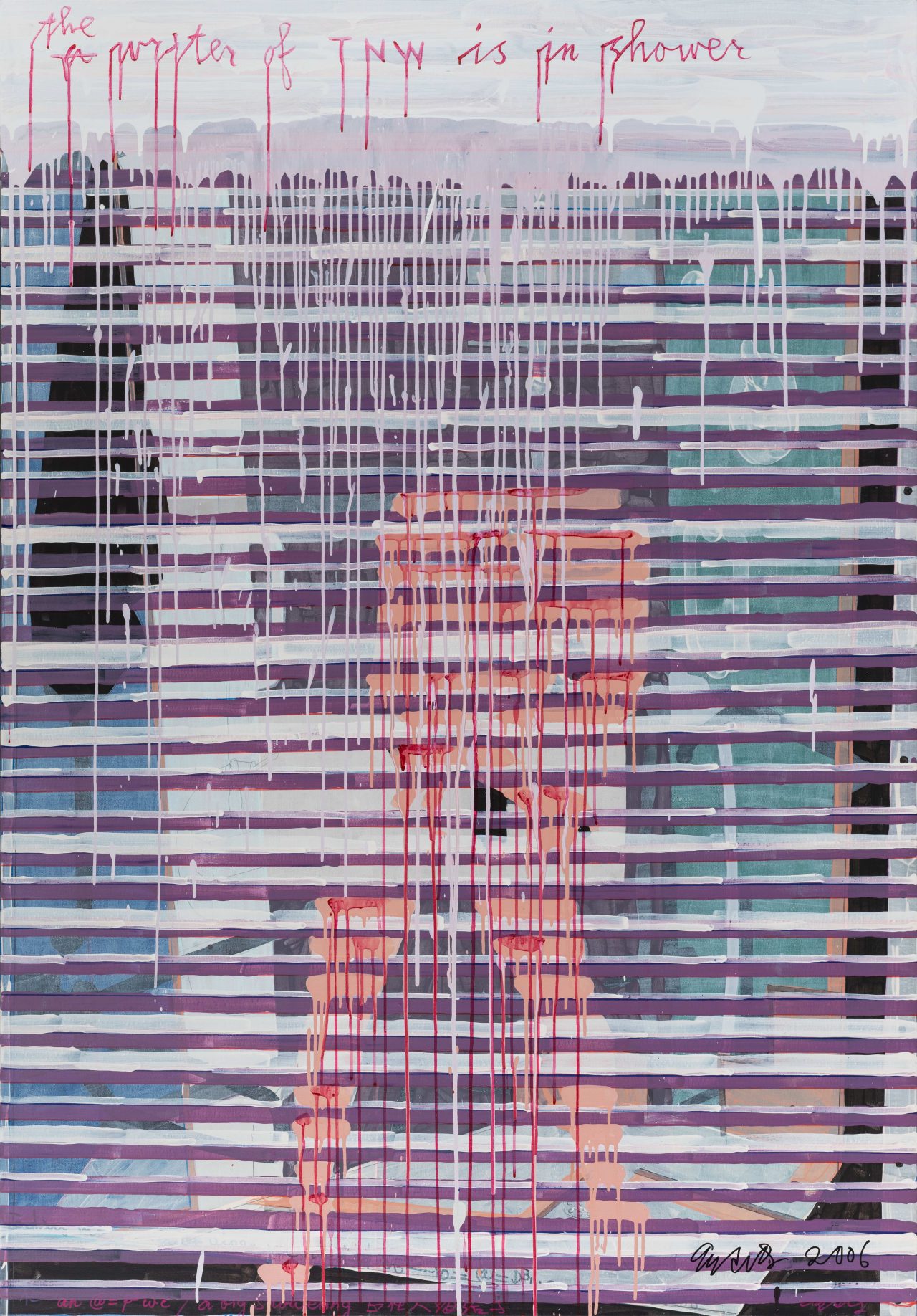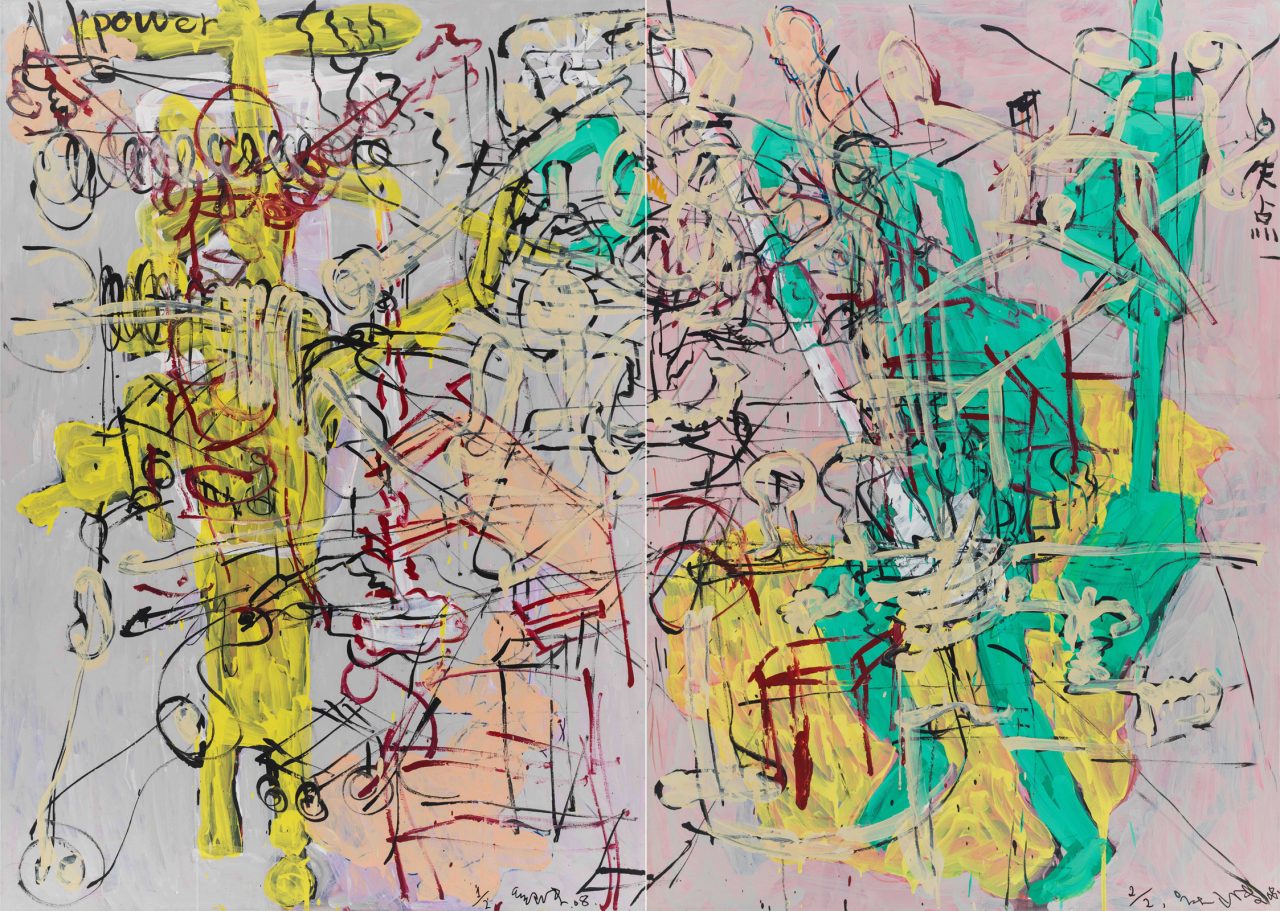Wu Shanzhuan: Everything Starts from Today No Water (II)
Duration: 22 APRIL 12:00 AM- 21 MAY 11:59 AM (CST), 2023

As secondhand writing, Today No Water is an installation work of language, or "a container of words". Wu once said, "useless sentences form the basis of Today No Water". This collection of useless writings carries a deeper significance in addition to the intent to "recycle" in order to protect the environment and develop sustainability. What Wu is after is rather a democratic state of writing than the so-called literary experiment. For Wu, the creative space of experimental literature is a fiction based on the assumption of the autonomy of literature, which has ruled human imagination for around a century. He does not want to get embroidered with such literary issues as reality, fiction and expression. On the issue of reality vs. fiction, Wu has the following observation: No story is untrue, it might happen here or there. The gist of the "true or false" question lies here – if a writer can finish a book, s/he's proved the book's false. If a book's falsity needs proof, then it shows that we're used to what's false. Today No Water is a finished book, therefore it's false. Falsity is the inertia of what's real, because the "energy" in explaining what's real is actually false.
When asked about "anitya (impermanence)" and "pratyaya (contingency)", Wu responded, "Suppose contingency is the 'cause' and everything in the world is its 'consequence', and then there is no such thing as contingency in life. When contingencies are translated into facts, tragedy is born. During my creating process, I adopt an 'amending' approach. I substitute contingency with sums. If there's no room for further addition, then it means we're already at the end. It's the same for anitya (impermanence)."
When asked about the fate of his fiction, he said, "Today No Water hasn't been thrown away yet, for there's no end in sight for our future. What is there today can still make tomorrow a reality as well as improve on the basis of what was there yesterday."
--Excerpted from Gao Shiming's An Anarchist Structure: Wu Shanzhuan & Inga Svala Thorsdottir's Thing's Right(s) etc.
[1] However, the "everyday/quotidian" here isn't the original "everyday" as the starting point of experience, but rather its "open domain". It is not so much an adverse movement as a traversal of the metaphysical origin.
[2] This is a fundamental political difference — for one this is a teleological politics modeled on perspective, the latter, however, anticipates a politics of concern based modeled on projection. This refers to Bruno Latour's description of the transformation from Realpolitik to Dingpolitik.
About Wu Shanzhuan
Wu Shanzhuan (b. 1960, China). One of the key figures of the '85 New Wave Art Movement in China, Wu Shanzhuan's practice defies use of conventional visual art terms such as "watch", "stare" and "experience" to engage with. Instead, pulling together street smartness, intellectual experimentation and the spirit of the absurd in contemporary art, Wu Shanzhuan and his collaborator Inga Svala Thorsdottir draw you into a world where "read" becomes the key term. They are not creators of visual spectacles, but rather overthrowers and discoverers of truths and propositions, as well as counterfeiters of ideology and interpreters of everyday theology.
Wu Shanzhuan defines himself as criminal, intermediary, tourist and labor. The works Wu Shanzhuan creates are not the granted artworks but rather "Wu's Things". From the large number of "Wu's Things" made in the early 1990s, we see a desire for full opening and "transcending the boundaries" and his obsession with mathematics and logic which brings a strange sense of truth to his works. For a society dictated by a variety of faiths and customs, this is an "adulterated" truth. Wu never tires of quoting from Sartre: "People are a bundle of useless passion". The use for his useless passion is to find "useless truths". For more than 20 years, Wu Shanzhuan has used the forumulas "pseudo-words", "thing's right(s)", "parthenogenesis", "secondhand water", "tourist information", "perfect bracket" and "bird before peace", all of which are "useless truths", to weave his personal ideology. This ideology constitutes a profound critique to the system of concepts and experiences that we are accustomed to.
In the era when conceptual art generally faces a rethink, the works attest a vibrancy of concept and the power of thoughts. It is a rich collection of intriguing humor and sharp wit, spontaneous anti-metaphysical actions, insights into everyday politics, sensitivity to invisible workings of power systems and adherence to the fundamental state of democracy.
Wu Shanzhuan: Everything starts from Today No Water (II)
Duration: 22 APRIL 12:00 AM
- 21 MAY 11:59 AM (CST), 2023

As secondhand writing, Today No Water is an installation work of language, or "a container of words". Wu once said, "useless sentences form the basis of Today No Water". This collection of useless writings carries a deeper significance in addition to the intent to "recycle" in order to protect the environment and develop sustainability. What Wu is after is rather a democratic state of writing than the so-called literary experiment. For Wu, the creative space of experimental literature is a fiction based on the assumption of the autonomy of literature, which has ruled human imagination for around a century. He does not want to get embroidered with such literary issues as reality, fiction and expression. On the issue of reality vs. fiction, Wu has the following observation: No story is untrue, it might happen here or there. The gist of the "true or false" question lies here – if a writer can finish a book, s/he's proved the book's false. If a book's falsity needs proof, then it shows that we're used to what's false. Today No Water is a finished book, therefore it's false. Falsity is the inertia of what's real, because the "energy" in explaining what's real is actually false.
When asked about their working field, Wu drew a sketch. This sketch reveals the two ways of dealing with the world — perspective and projection. The world view based on perspective (established since the Renaissance) has shaped our everyday attitude, i.e., the teleological cognitive model between subject-object. Such a model often sublimates the quotidian into politics, ending up in theology with a metaphysical origin as its destination or demise where God's dwelling, the final cause and end, can be found, its view being a closed cone; but what Wu and Inga are working on is projective in nature, as it goes from this "origin" to reach the quotidian beyond politics.[1] This is the adverse of a cone that is wide open, an area signposted by Wu and Inga's "perfect parenthesis", "at large" from alpha to omega.[2]
When asked about "anitya (impermanence)" and "pratyaya (contingency)", Wu responded, "Suppose contingency is the 'cause' and everything in the world is its 'consequence', and then there is no such thing as contingency in life. When contingencies are translated into facts, tragedy is born. During my creating process, I adopt an 'amending' approach. I substitute contingency with sums. If there's no room for further addition, then it means we're already at the end. It's the same for anitya (impermanence)."
When asked about the fate of his fiction, he said, "Today No Water hasn't been thrown away yet, for there's no end in sight for our future. What is there today can still make tomorrow a reality as well as improve on the basis of what was there yesterday."
--Excerpted from Gao Shiming's An Anarchist Structure: Wu Shanzhuan & Inga Svala Thorsdottir's Thing's Right(s) etc.
[1] However, the "everyday/quotidian" here isn't the original "everyday" as the starting point of experience, but rather its "open domain". It is not so much an adverse movement as a traversal of the metaphysical origin.
[2] This is a fundamental political difference — for one this is a teleological politics modeled on perspective, the latter, however, anticipates a politics of concern based modeled on projection. This refers to Bruno Latour's description of the transformation from Realpolitik to Dingpolitik.
About Wu Shanzhuan
Wu Shanzhuan (b. 1960, China). One of the key figures of the '85 New Wave Art Movement in China, Wu Shanzhuan's practice defies use of conventional visual art terms such as "watch", "stare" and "experience" to engage with. Instead, pulling together street smartness, intellectual experimentation and the spirit of the absurd in contemporary art, Wu Shanzhuan and his collaborator Inga Svala Thorsdottir draw you into a world where "read" becomes the key term. They are not creators of visual spectacles, but rather overthrowers and discoverers of truths and propositions, as well as counterfeiters of ideology and interpreters of everyday theology.
Wu Shanzhuan defines himself as criminal, intermediary, tourist and labor. The works Wu Shanzhuan creates are not the granted artworks but rather "Wu's Things". From the large number of "Wu's Things" made in the early 1990s, we see a desire for full opening and "transcending the boundaries" and his obsession with mathematics and logic which brings a strange sense of truth to his works. For a society dictated by a variety of faiths and customs, this is an "adulterated" truth. Wu never tires of quoting from Sartre: "People are a bundle of useless passion". The use for his useless passion is to find "useless truths". For more than 20 years, Wu Shanzhuan has used the forumulas "pseudo-words", "thing's right(s)", "parthenogenesis", "secondhand water", "tourist information", "perfect bracket" and "bird before peace", all of which are "useless truths", to weave his personal ideology. This ideology constitutes a profound critique to the system of concepts and experiences that we are accustomed to.
In the era when conceptual art generally faces a rethink, the works attest a vibrancy of concept and the power of thoughts. It is a rich collection of intriguing humor and sharp wit, spontaneous anti-metaphysical actions, insights into everyday politics, sensitivity to invisible workings of power systems and adherence to the fundamental state of democracy.




